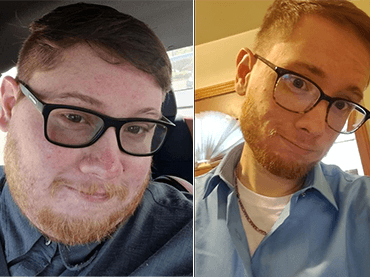Meet Matt Schleicher
It was June 2020. While the world was being transformed by the COVID-19 pandemic, 30-year-old Matt Schleicher was at his home in Beaver County, Pa., contemplating the future of his own health.
“I really started to see how my weight was affecting me,” Matt recalls. “I would drop pounds, only to regain them, over and over again. I just didn’t have a good relationship with food. Enough was enough.”
Matt’s weight was at an all-time high of 435 pounds. He says his lifestyle was the issue, and he did not get enough physical activity. Matt did some research and ultimately decided to explore a surgical solution, scheduling a consultation with Christopher Myers, MD, from UPMC Bariatric Services.
“This confirmed that bariatric surgery would be the right option for me,” Matt explains. “I could tell Dr. Myers was not only committed to performing a successful procedure but also ensuring that I would be satisfied with my long-term results.”
Preparing for the Procedure
Before bariatric surgery, patients are required to lose weight and ideally adopt a healthier mindset. So, Matt knew he had work to do but was up for the challenge.
“I realigned my mind and started undoing some of the damage that had been done,” Matt says. “I cut out calories and foods that had been problematic, and I became really focused on making good decisions.”
Matt’s surgery was scheduled at UPMC Jameson in New Castle on Dec. 1, 2020. He lost 67 pounds leading up to that day, which included a liquid diet for 10 days prior to the procedure, covering Thanksgiving and Matt’s birthday.
“That was a humbling experience to get through,” Matt says with a laugh. “But I’m so glad UPMC provided plenty of time for me to reset myself and properly prepare.”
Life After Weight Loss
During Matt’s gastric sleeve surgery, the size of his stomach was reduced, restricting how much food he can eat and allowing him to feel fuller sooner. He recalls the recovery process being a lot easier than expected, starting with walking laps within the hospital, followed by additional exercise outdoors.
“I started walking one mile, then two, up to five, and finally 10,” Matt recalls. “I also learned how to eat with my smaller stomach. The weight just kept coming off.”
After losing 230 pounds, Matt noticed that his excess skin was getting in the way of his new workout routine. He could walk but not run, and pushups were difficult. This led him back to UPMC, this time to J. Peter Rubin, MD, who founded the Department of Plastic Surgery’s Life After Weight Loss more than 20 years ago.
“Dr. Rubin was incredibly thorough,” Matt says of their first meeting. “He showed me each of the ways that he would contour my body, actually taking folds of skin and explaining how I would soon be shaped differently. He wasn’t shy about being honest and setting expectations.”
Patients are encouraged to wait at least two years after bariatric surgery before undergoing surgery to remove excess skin, so Matt’s procedure was scheduled for June 10, 2023. Dr. Rubin performed a lower body lift, removing skin from the stomach, hip, and lower back, as well as gynecomastia repair, or male breast reduction. By the time Dr. Rubin was done, Matt had shed 12 more pounds.
“…when I look in the mirror.”
Now with two surgeries completed over the course of three years, Matt’s weight has stabilized at a little less than 200 pounds. He’s actively involved in sports, has joined two bowling leagues, and recently bowled his first 300 (perfect) game.
“I still can’t believe what I see when I look in the mirror,” Matt says. “I’ve completely changed, going from a size 5XL down to a large. My clothes fit me so much better. I’m able to do so many things I couldn’t before, even things as simple as tying my shoes, walking my dogs, or riding roller coasters at Kennywood.”
In the summer of 2024, after months of training, Matt completed the Homestead Challenge on the Rachel Carson Trail, which consists of 18 miles in one day. After all he’s been through on his weight-loss journey, he feels healthier and more confident but is quick to mention that he hasn’t done it alone.
“It’s so important to have a solid support group in your corner,” Matt explains. “And that includes my care teams at UPMC, genuine people who told me never to hesitate to reach out with any questions or concerns. Before my time with them, I was just watching my life go by, but now, I’m actually living.”
Matt’s treatment and results may not be representative of all similar cases.

















